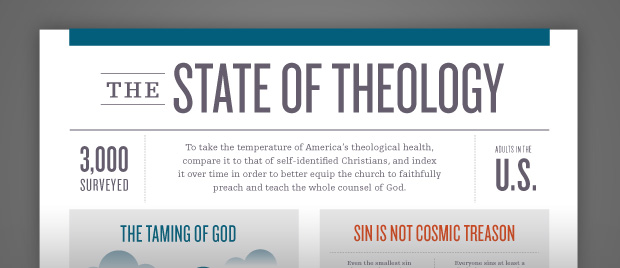Worshiping Alone

It’s difficult to be a pastor in America these days. Five out of ten Americans think you don’t need the church. So do three out of ten Evangelical Protestants. As the The State of Theology survey also shows, the majority of Americans do not see their pastor’s sermons as carrying authority over them. You can find the full results of the survey at TheStateOfTheology.com. These few questions related to the local church, however, deserve a closer look and our significant attention.
As we turn to the pages of the New Testament, we see the church emerging as the institution God blesses. The gospel accounts end with Jesus promising to build and establish His church, and Acts begins with the church in fact being built and established. Paul was a church planter. The last letters that he wrote and that were included in the Canon were his Pastoral Epistles. In these final inspired words, Paul lays down the law for God’s people. For Paul, the church is the household of God, the Living God. The church is the pillar and buttress of truth (1 Tim 3:15).
This fledgling church continued to thrive against all odds. It suffered persecution without at the hands of the Roman Empire. It also faced hardship within at the hands of false teachers and heretics. Yet, the church grew and flourished. It is hard to look over the pages of church history and not see the church playing an indispensable role in the lives of individual Christians. John Calvin writes,
I shall start, then, with the church, into whose bosom God is pleased to gather his sons, not only that they may be nourished by her help and ministry as long as they are infants and children, but also that they may be guided by her motherly care until they mature and at last reach the goal of faith.
Calvin adds, “For those to whom he is Father the church may also be Mother” (Inst. 4.1.1.). Here Calvin references the church father Cyprian: “You cannot have God for your Father unless you have the church for your Mother.” Through the centuries the church was indispensable.
Why Prefer Worshiping Alone?
In light of the high view of the church over the past millennia, where are the low views of the church reflected in this survey coming from? In 1995, public policy scholar Robert Putnam published an article in a scholarly journal titled, “Bowling Alone.” The article made a huge splash, landing Putnam an invitation to the White House and a spread in, of all things, People magazine. In 2000, he followed up with a book by the same title. Putnam’s work shows the decline of social groups and fraternities in the US. He used bowling and bowling leagues as his exemplar. His findings? Bowling leagues were down, but bowling was up. American individualism, seeded in our very beginnings and cultivated through our celebration of the rugged individual, has come to harvest. We prefer to go it alone.
The individualism is one thing, there is also the problem of our historylessness. Not only do we not need others, we don’t need others from the past, either.
This tendency is also borne out by the survey. When asked if historical Christian creeds played a role in one’s own discipleship, a whopping 70 percent said flat out no. Only a handful of Evangelical Protestants affirm any value in studying historic creeds and catechisms.
When five out of ten Americans think you can worship alone, that’s bad. When seven out of ten Americans think you don’t need the past, that’s bad, too.
And then there’s the issue of refusing to submit to pastoral authority. This tendency goes back to the fall. We skirt authority. We aid and abet rebellion. We see ourselves as little Bravehearts, shouting, “Freedom,” and straining with our last breath to stand up for our individual rights. That’s bad, too.
What should our response be?
So how do we respond? First, these survey results regarding American attitudes towards the local church and towards the historic church reflect the influence of American culture winning over the Bible. It should always be the other way around.
The Bible makes it rather clear that we were made for community. We gather together for the worship of God. The Bible makes it rather clear that there are structures of authority in regards to spiritual matters. The Bible makes it also rather clear that when we fail to honor and remember the past, we set ourselves up for failure. “Remember the Exodus,“ the prophets told Israel. Remember that you are a people with a past.
We also need to remember that the Holy Spirit is not our unique gift. The Holy Spirit is the gift to the church. Charles Spurgeon said it best, “I find it odd that one who thinks so highly of what the Holy Spirit teaches him, thinks so little of what the Holy Spirit teaches others also.”
When we cut ourselves off from worshiping together and using the past and the historic church in our discipleship, we are cutting ourselves off from the ministry of the Holy Spirit—and we stand in violation of God’s clear commands to gather together. The act of bowling alone is not merely a sociological phenomenon with deleterious consequences for civil society. It stands against God’s design for us and against God’s law over us. We were made for community. God ordained the church and the pastoral office and the means of grace. The church, both local and historic, is God’s good gift to us. Do we know better than our heavenly Father?
This article is part of the State of Theology collection.
